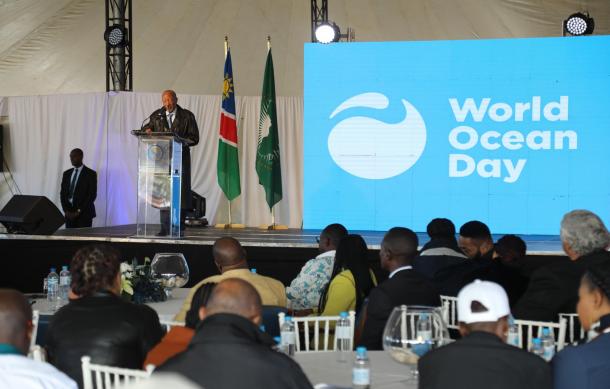
President Nangolo Mbumbu says the ocean, on which billions of people depend, is under threat from climate change and the harmful activities of humans.
Dr. Mbumba made this statement during the 32nd World Ocean Day commemoration held under the theme "Catalysing Action for Our Ocean and Climate" at Walvis Bay Independence Beach today.
President Mbumba says that rising sea levels, ocean acidification, plastic pollution, and illegal, unreported, and unregulated fishing practices are just a few of the challenges faced.
Therefore, it is imperative for Namibia to take urgent action to address these issues before it is too late.
The President added that by reducing carbon emissions, eradicating plastic pollution, and actively combating all forms of environmental degradation, Namibians can give their ocean a breath of fresh air.
Therefore, he says that the youth, as catalysts of change, are central to creating a nexus between climate, nature, and development, and as such, they should play an integral role in the management of the ocean.
Robust ocean health, he says, plays a vital role in supporting biodiversity and supporting global ecosystems through the regulation of climate.
"Many of you may recall that on December 3, 2020, the Ocean Panel's Transformation Document, titled "A Vision for Protection, Production, and Prosperity," was launched. This commitment document emphasises a 100% approach, which commits all Ocean Panel Members to sustainably manage 100% of the ocean area under national jurisdiction by 2025. These bold steps demonstrate our recognition that the health of the ocean is critical to the environmental, economic, and social well-being of people and the planet at large."
To date, Dr. Mbumba says the country is close to finalising its Blue Economy Policy, which also encompasses a Marine Spatial Plan, and will be amplified further through the development of a Sustainable Ocean Plan by 2025.
"These important documents seek to ensure the sustainable and integrated development of our ocean economy. The blue economy stands on three pillars, namely, environmental sustainability, economic sustainability, and social inclusion. It is therefore crucial that we safeguard our ocean from adverse impacts and that we apply a precautionary approach at all times to activities that have the potential to cause harm to biodiversity."
Dr. Mbumba reminded the nation that the ocean is not just a vast expanse of water but a foundation of life, a source of hope, and a gateway towards prosperity for the nation's economy and that of many other countries.
He further encouraged Namibians to safeguard the ocean and climate, thereby ensuring a sustainable future for all humanity.
The World Ocean Day commemoration was hosted by the Ministry of Fisheries and Marine Resources.





